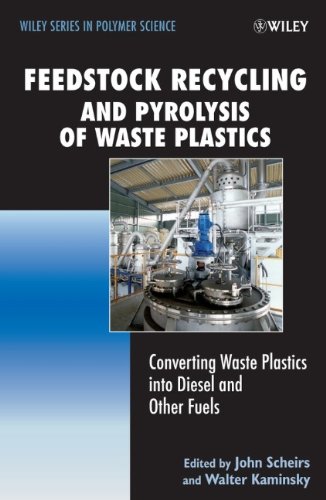Feedstock Recycling and Pyrolysis of Waste Plastics by Scheirs J., Kaminsky W.


Feedstock Recycling and Pyrolysis of Waste Plastics Scheirs J., Kaminsky W. ebook
Page: 792
Format: pdf
Publisher: Wiley
ISBN: 0470021527,
Thus, we attempt to address the problem of plastic waste disposal and Chemical recycling, that is, conversion of waste plastics into feedstock or fuel has been recognized as an ideal approach and could significantly reduce the net cost of disposal. Collected PET plastic containers are delivered to a materials recovery facility to begin the recycling process. Rent or Buy Feedstock Recycling and Pyrolysis of Waste Plastics : Converting Waste Plastics into Diesel and Other Fuels – 9780470021521 by Scheirs, John for as low as. A range of feedstock recycling technologies is currently being explored. Extruding Plastics - A Practical Processing Handbook. Feedstock Recycling and Pyrolysis of Waste Plastics. These include: pyrolysis, hydrogenation, gasification and thermal cracking. So the methods of converting plastic into fuel, specially pyrolysis and catalytic degradation, are discussed in detail and a brief idea about the gasification is also included. Excluded Volume Effects in Polymer Solutions. Feedstock recycling describes a range of plastic recovery techniques to make plastics, which break down polymers into their constituent monomers, which in turn can be used again in refineries, or petrochemical and chemical production. Engineering Materials (Polymer Part). Polythene ( Plastic ) Waste Recycling. The raw material feedstock includes auto fluff, e-wastes, scrap tires, recyclable and non-recyclable plastics, synthetic fibers, used industrial solvents, waste oil and heavy refinery bottom oil. Biogas Feedstock in the Middle East · Methods for Plastic . Pyrolysis heats up A: There are two primary reasons why plastics- to-oil technology is more advanced today than other types of pyrolysis oil, according to the RTI study: a reliable supply of feedstock (waste plastic) and greater consistency in the types of waste material available. Tada, The liquefaction of plastic containers and packaging in Japan, Feedstock Recycling and Pyrolysis of Waste Plastics, pp. FORTAN pyrolysis plants to recycle various waste; 2. A number of companies (as well as some innovative individuals) are already using different versions of a technology called pyrolysis to convert waste plastic into usable fuel oil. Polythene Waste: Polythene is just a technical term for PLASTIC, 'poly' meaning polymer, and one of the most common types at that. "We really need to convert all the plastic waste except for PVC which, at this point, cannot be recycled into fuel." PVC, or poly vinyl chloride, is considered by many experts to be the most toxic plastic of all because of its high chloride content. Pyrolysis is a recycling technique converting plastic waste into fuels, monomers, or other valuable materials by thermal and catalytic cracking processes.